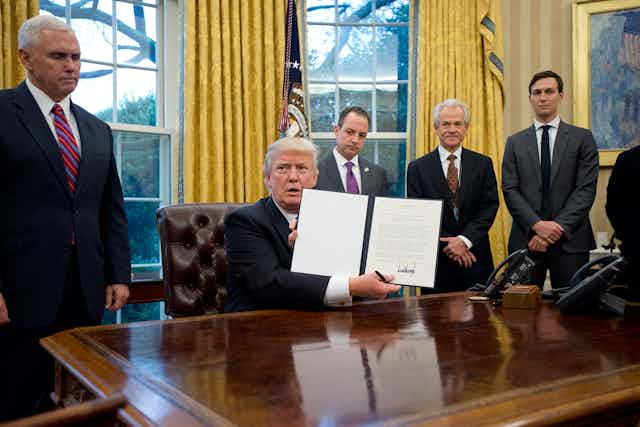Editor’s note: The following is a roundup of archival stories.
Donald Trump made his antipathy to current U.S. trade deals a key part of his campaign and launched his presidency by beginning to rip them up.
He said he plans to renegotiate the 23-year-old North American Free Trade Agreement (NAFTA) – “at the appropriate time” – and on Jan. 23 formally pulled the U.S. out of the Trans-Pacific Partnership (TPP). Trump also warned he would impose a “very major border tax” on U.S. companies that ship jobs overseas.
What does all this mean? We plumbed our archive to offer some context on the complex topic of trade.
TPP primer
When people argue about trade deals, for and against, the reasons tend to be economic or about the threat to someone’s job. Marina v. N. Whitman, a professor of business administration and public policy at the University of Michigan, argues the stakes are even higher. The U.S. decision to exit the TPP weakens national security and even threatens the “Pax Americana” that helped maintain global stability since World War II, she writes.
“At stake is a principle much broader than the struggle between China and the United States for the ‘soft power’ inherent in the competition over trade agreements… A U.S. failure to authorize the TPP could be the coup de grâce for the Pax Americana.”
Rachel Rothschild, who researches the history of environmental science and diplomacy at NYU, sees it differently, arguing the TPP has too many “glaring deficiencies.” It also departs from a half-century of progress tying environment and human rights to major diplomatic agreements on nuclear weapons and Soviet influence.
“We are facing the rise of another political and economic power with strikingly different values than our own, including support for democracy, the free market and environmental protections. The possibility that other countries could follow China’s example would hinder U.S. attempts to promote basic rights around the world, similar to the issue of containing Soviet communism at the outset of the Cold War.”
As for the economic issues, Greg Wright of the University of California, Merced, and Emily Blanchard of Dartmouth examined the evidence behind claims that the TPP would lead to millions of job losses. The truth is more complex.
“The simple truth is that trade agreements change the composition of jobs in the economy. Some workers will be happier with their new jobs, and others will not. Whatever the job losses from the TPP, a roughly equal number will be created.”
Helping the losers of trade
Whether or not past trade deals have on balance created more jobs than they’ve lost, the focus lately has been on those who feel left behind and whether we’ve done enough to soften the blow. We haven’t, writes Michigan’s Whitman. That’s why the program designed to help them, often dubbed “burial insurance,” needs significant reform.
“Studies suggest that the American labor market is not as fluid and flexible as we thought. Job losers were not able to find new ones as quickly as expected nor command the same level of wages when they did. This finding is consistent with other research indicating that the in-country mobility of blue-collar American workers has been falling.”
Lessons from NAFTA
Trump and others say NAFTA is the root of the problem. While it’s unclear when the president will begin renegotiating that massive trade agreement, Harley Shaiken of the University of California, Berkeley, explains what we can learn from it.
“By strengthening investment protection and largely ignoring worker protections, real wages in Mexican manufacturing continued to slide in the wake of NAFTA, declining almost 20 percent from 1994 to 2011 while productivity grew almost 80 percent. This loss for Mexican workers also contributed to a sharp downward pressure on manufacturing wages in the U.S.”
Free trade in peril
With the TPP and other international trade agreements in trouble and a protectionist American president in power, globalization and free trade seem to be in peril. But it’s still important to fight for them, writes Charles Hankla of Georgia State University.
“The rejection of these important agreements could risk becoming merely the first step in a gradual erosion of support for the global economic architecture. This architecture, so carefully created and maintained by the United States after 1945, has contributed mightily to international prosperity and peace. Maintaining it is of critical importance.”
Could Trump’s protectionist policies lead to a trade war? Marc-William Palen, a trade historian at the University of Exeter, reminds us of a few – and their painful consequences. One example:
“When the Republicans passed the even more protectionist Dingley Tariff in 1897, Canada decided that the best response was a double dose of tariff retaliation and closer trade ties with the British Empire rather than the United States. It took nearly a century after this for free trade between the U.S. and Canada to develop.”

